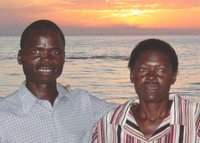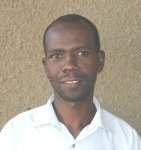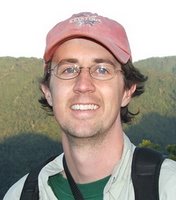 
While some of our team were gathering in Nairobi from Bangkok, St. Petersburg, Lusaka, Zambia and Accra, Ghana, others were leaving from Arizona, Missouri, Tennessee and Texas. We all gathered in Nairobi to finalize our documentation to enter South Sudan. On July 17, our team began the journey north in two shifts to arrive on consecutive days at our destination in south-western Sudan where we had heard there were refugees needing help. But we had no ‘hard’ information about the place (other than that the runway was short and the rains were heavy) and no communication with anyone in the area. I felt like we were ‘flying blind.’ So we had a contingency plan to do a quick survey before landing and be prepared to take off for another location if there was a hostile reception in Raja.
Meanwhile, hundreds of people were praying for ‘people of peace’ (Luke 10, Matt. 10) to receive us when we landed. The first group to land were met by the leaders of the town and the county and immediately taken to the offices of the Commissioner of the Raja County. They were introduced, welcomed and assigned a place to camp on the edge of the town of Raja: the compound of the Red Crescent. The ‘green light’ was given the second half of the team to fly in the next day. I was on that second flight and was surprised when I was met by Edward, the acting Commissioner of Raja County who said, “Are you Sam?” When I said yes, he said, “Please your transport is over here.” He immediately bundled us all into two pickups and took us to the county offices. It was hard to believe the warm reception, the cooperativeness, the offers of help, the desire to understand our mission, the provision of bedding and transportation put at our disposal ... all of this, without any advance notice that we were coming!! It was a huge encouragement to all of us. At the same time, it was disappointing that the refugee camp was 63 miles away and by some reports inaccessible by road. We saw serving Darfur refugees as a primary purpose of the mission. How could we possible get there? The first few days in Raja were spent setting up camp, organizing ourselves into teams for different tasks, getting to know the town of Raja, prayer-walking through its streets(?), surveying and serving in local medical facilities and, very importantly, meeting and beginning to build relationships with a stream of people who came by our camp to greet us and find out what our mission was. We also interviewed local U. N. officials, other aid missions, the police, army and local government departments to find how get to and serve in the refugee camp. It was decided that we would need to send out a scouting team to the area to check out the condition of the road and living conditions in the camp.

We sent out our ‘Caleb Corps,’ a team of young men, guides and police guards who made the arduous 5-hour trip to the camp by motorcycle over a rugged forest track through rain and marshes. Their mission was to make a brief survey of the needs in the camp and to determine the feasibility of the larger team getting there and doing something to help the 'internally displaced people' there. The corps arrived there late in the afternoon and checked out conditions and needs in the camp. They surveyed what they thought we could do and what it would take for a larger crew to get there. Because the security situation was unclear, this team of scouts was under orders to return the same day. So the any set off on their return journey about 4:30 p.m. already close to exhaustion from exposure to the tropical sun and physical exertion. They dragged into Raja a little after 9 that night completely worn out but optimistic about what our mission could do.
That weekend we began to plan in earnest for a mission to Boro-Medina. The hospital, the police and the Islamic school in Raja each offered to loan us a vehicle to get to Boro. Our friend, Isaac Suliman, the chief of police arranged an armed guard to accompany us. Our part was to provide fuel for the vehicles and food for the drivers and guards as well as all the supplies we would need.
On the Monday, after many delays and much indecision, we set off for Boro-Medina. It was an arduous four-and-a-half-hour drive. We arrived a couple up hours before dark and immediately went to work setting up camp. Some slept in the camp director's office area, others had tents in the yard.
The next morning Dr. Mike Smith and Glenn Berkey left camp early to set up and organize a medical clinic. Other members of our team served as assistants, interpreters and maintained order in the lines of people. That day more than 500 hundred patients were interviewed, examined and treated. Some of the common diseases were typhoid, tuberculosis and other respiratory ailments and a number of cases of epilepsy. Others of our team did prayer-walks throughout the camp, prayed for mothers and their children. We found that there were few men in the camp. Surveys were made of the local school, available housing, water supplies, airstrip, medical facilities, roads and availability of food. We had previously made arrangements with local World Food Program directors in Raja to help with distributing food supplies to hungry people in the camp. The WFP had a large tent in Boro that was locked. There were food supplies in the tent, but no arrived during our time in Boro to unlock the tent and make food available to the people of the camp. We actually spent on parts of three days at Boro.
The Journey...
In my view, the most important story of our journey was the many small and great acts God did in response to prayers of so many of our friends who were in regular intercession for the mission. As an example, one small act of God that blessed me in a big way was the woman from Gibraltar who sat next to me on our flight from London to Nairobi. As we walked up the jetway in Nairobi, she pulled me aside and asked me to accept a $100 bill for our Sudan mission. Wow! A complete stranger (angel?).
For me personally, the greatest struggle was inside of me; my personal struggle to truly trust God in all this. I had never taken on the responsibility of leading so many (over 20 men including my two sons) from so many places, to such a remote location with so little knowledge about what was there, what the mission would be and whether we could actually even land a plane there.


